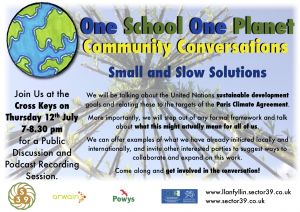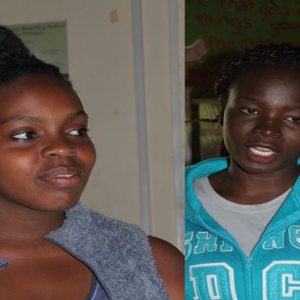One School One Planet Podcast
Hosting conversations on the fertile edges of permaculture, ecology and education.
Episode 13

In this week’s episode we feature select edits from a community conversation at the Cross Keys in Llanfyllin on the theme of ‘Building Resilient Networks.’ We cover a lot of ground in the discussion and demonstrate that Llanfyllin already has the infrastructure in place to be a resilient community, it is just a matter of connecting the dots and starting dialogues between different segments of the community.
Episode 12

This episode features extracts from the second of our Community Conversation events at The Cross Keys in Llanfyllin. The theme for the discussion, which includes several different voices from the community, is ‘Small and Slow Solutions.’ As the conversation progresses it becomes clear that Llanfyllin already has a number of nodes of activity in place, all that remains to be done is for the dots to be connected. This leads nicely into the next Community Conversation, which will have the theme of ‘Building Resilient Networks.’
Episode 11
 In this episode we report back on two days of work with staff and students of Llanfyllin High School. The first section comprises Steve’s introductory talk to the students on fruit tree guilds, followed by discussions with students learning how to scythe. We then planted a fruit tree guild at the High School with a group of students who explain the designs of their information boards to us. The episode concludes with a reflection on the successes of the One School One Planet project so far, as we move closer to the start of the project’s third year. We were also joined by Dewi Morris at Cae Bodfach Community Garden.
In this episode we report back on two days of work with staff and students of Llanfyllin High School. The first section comprises Steve’s introductory talk to the students on fruit tree guilds, followed by discussions with students learning how to scythe. We then planted a fruit tree guild at the High School with a group of students who explain the designs of their information boards to us. The episode concludes with a reflection on the successes of the One School One Planet project so far, as we move closer to the start of the project’s third year. We were also joined by Dewi Morris at Cae Bodfach Community Garden.
Episode 10
 In our first episode after a brief hiatus, Steve and Jack reflect on some of the work they have been doing over the last few weeks – Steve’s PDCs in Uganda and his work with the Norwegian Refugee Council, and Jack’s continuing research into the ‘spiritual’ and ‘experiential’ dimensions of Permaculture.
In our first episode after a brief hiatus, Steve and Jack reflect on some of the work they have been doing over the last few weeks – Steve’s PDCs in Uganda and his work with the Norwegian Refugee Council, and Jack’s continuing research into the ‘spiritual’ and ‘experiential’ dimensions of Permaculture.
The main bulk of the episode consists of an edited recording from a public discussion hosted at The Cross Keys in Llanfyllin. The discussion was structured around the themes of historic buildings and co-operatives, and Sector39’s recent work in Uganda.
We are going to do more sessions like this in the coming weeks.
Episode 9

This week we have more interviews from the PDC at Sabina School in Uganda. Steve talks to Mercy and Victoria from BEU (Broadleaf Enterprises Uganda), a permaculture enterprise established by Mugarura Charles.
The discussions cover the importance of permaculture education at primary level, the need to encourage young people to engage with agriculture, the difficulties inherent in communicating permacuture ideas to governments, and the vital importance of re-connecting with the Earth and with the soil as a foundation for the social, economic, agricultural and educational changes that will need to take place if we are to meet the targets of the Paris Agreement.
Episode 8

In this episode Steve brings us two interviews and a discussion from participants in the PDC he is currently teaching at Sabina School in Uganda. Participants give fascinating insights into their backgrounds and motivatiosn for attending the PDC. Discussions cover the importance of working with the environment through organic agricultural methods, the implementation of ideas through putting education into action, the history of permaculture in Africa and the necessity to incorporate permaculture and eco-literacy into mainstream education on a global scale!
Episode 7

In this episode Steve talks to Grace Maycock, Nina Duckers and Han Rees – three ex-students of Llanfyllin High School – who are currently based at Sabina School in Uganda in preparation for PDCUG2018, the upcoming Sector39 Permaculture Design Course. They talk about their impressions of Uganda and their experiences so far at Sabina School working with staff and students on the school site. We will be featuring more interviews from Uganda in due course.
Then, Jack talks a little about the Clun Greenman Festival that he attended over the weekend, and ponders on the possible role of these kinds of public rituals in re-establishing the link between communities and their environment.
Episode 6

This week we have a very short episode due to Steve’s impending journey to Uganda.
In this episode Steve and Jack discuss the complex ecology of the Cae Bodfach Community Garden, exploring how the plants interact with one another, the succession of plant species, and the uses of various wild plants we found growing in the orchard.
In the coming weeks Jack will continue to interview guests for the podcast, while Steve is in Uganda. We will also hopefully be including content from the PDC at Sabina School, as well as material recorded during the First East Africa Permaculture Convergence.
Episode 5

This week Steve and Jack are joined by Dr. Andy Letcher, co-ordinator of the new MA in Ecology and Spirituality at the Schumacher College, Dartington.
In our conversation we discuss Andy’s background in ecology, environmental activism and the Study of Religion. We cover the history of the Schumacher College and the contents of the MA course, and explore the importance of ecological education, as well as the difficulties inherent in translating the interconnted complexities of something like permaculture, or ecology and spirituality, into an educational setting. We also cover the contribution spirituality can make to practical efforts at tackling the eco-crisis.
The interview is punctuated by brief discussions from Steve and Jack, as they unpack some of the ideas Andy presents.
Show Notes:
Centre for Alternative Technology
MA in Ecology and Spirituality, Schumacher College
Credits:
Music by The Leatherette Barn Owl
Episode 4

This week Steve and Jack are back at Cae Bodfach Community Orchard to catch up with conservation educator Dewi Morris and Emyr Jones, leader of the GCSE Land-Based Studies course at Llanfyllin High School.
Dewi explains how the community orchard has developed over the last four years and why Afon Cain is so important to migrating Atlantic Salmon. Emyr suggests that if we are to stay living and working in the countryside into the future, we are going to have to radically alter our agricultural practices and how we educate the next generation of farmers.
Discussions centre on the idea of guilds and systems, and around understanding how our actions (no matter how small) have an impact on both a local and global scale.
Show Notes:
Episode 3

This week Steve and Jack discuss the progress that has been made over the weekend at the Cae Bodfach Community Garden with students from the 2017-18 Chester Cathedral PDC.
They are then joined by Lusi Alderslowe, who co-ordinates the Permaculture Association’s ‘Children in Permaculture Project.’ They discuss the origins of the project, the importance of permaculture education in schools, and the process of getting permaculture into the mainstream curriculum in Scotland.
Lusi is co-author of the soon-to-be-published ‘Children in Permaculture Manual: Inspiring Earth Care, People Care and Fair Share in Education.’
The episode concludes with an outline of a plan to report back from the upcoming permaculture convergence (PDCUG18) Steve and colleagues are organising at Sabina School in Rakai, Uganda. The school was one of the first in the region to adopt permaculture principles in its grounds, curriculum and all-round ethos.
Show Notes:
Mulching Cae Bodfach Community Garden.
Children in Permaculture Project.
Children in Permaculture Manual: Inspiring Earth Care, People Care and Fair Share in Education.
One School One Planet Textbook.
Permaculture Convergence 2018, Sabina School, Rakai, Uganda.
Sabina School’s Curriculum Philosophy.
Episode 2

In Episode 2, Steve and Jack talk about how permaculture education works, and how the permaculture approach can be incorporated into the mainstream education system.
Our guest on this week’s show is Claire Henderson Davis, Contemporary Performance Artist and Theologian in Residence at Chester Cathedral. Claire talks about her background in performance and theology, and her experience convincing Chester Cathedral to implement permaculture principles on its grounds.
Steve and Jack then wrap up with an overview of the work of the current Chester Cathedral PDC.
Show Notes:
One School One Planet Textbook
http://www.clairehendersondavis.com/
Claire’s Book – ‘After the Church’
Episode 1

In the first episode Steve Jones and Jack Hunter discuss the work they are doing at Cae Bodfach Community Orchard with students from Llanfyllin High School.
The conversation moves to explore permaculture principles, ecology, worms and consciousness.
Also included in this episode is an interview with Steve Pickup, founder of The Willow Bank, and specialist in willow cultivation, who talks about the benefits of hands-on participation in the ancient craft of willow weaving.
Show Notes:
https://www.facebook.com/llanfyllintransition
https://www.facebook.com/caebodfach
https://www.facebook.com/thewillowbank.uk
Paul Stamets on Mycelial Intelligence
Doughnut Economics by Kate Raworth